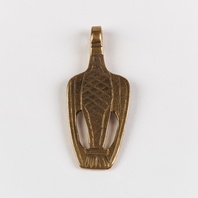
Viking Objects
Reproduction Bird Pendant
A reproduction bird pendant based on one found at Langford, Nottinghamshire. The nearest parallel to this type of brooch is one from Yaroslavl in Russia. The bird symbol, very similar to the one depicted on this pendant, was used by the Rurik dynasty which had started the conquest of Slavic lands in the mid 9th century and later formed the polity of Rus’. With some exceptions, pendants were generally worn by women as an accessory to Scandinavian dress.
Read More
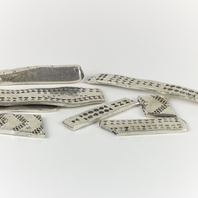
Viking Objects
Reproduction Hacksilver
These white metal reproductions of Viking Age hacksilver are typical of hacksilver finds. The Scandinavians had a bullion economy in the Viking Age and paid for goods by weight of silver rather than by using coins with a set monetary value. Arm rings are one example of wearable wealth that could be cut up to pay for goods when needed.
Read More
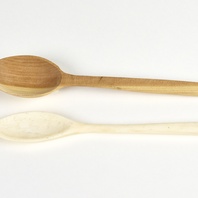
Viking Objects
Reproduction Wooden and Bone Spoons
Most ordinary people in the Viking Age would have used spoons made of bone or wood. These are typical examples of the types of spoons that people would have had. Wealthier people would have had copper alloy or silver spoons.
Read More
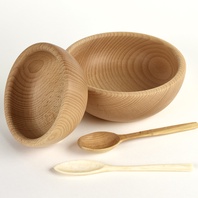
Viking Objects
Reproduction Wooden Bowls
Many everyday utensils would have been made from bone or wood. These photographs feature examples of wooden bowls.
Read More
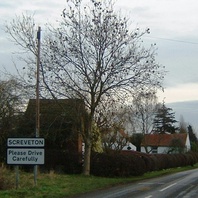
Viking Names
Screveton
Screveton, in the Bingham Wapentake of Nottinghamshire, is made up of two Old English elements, scir-gerefa ‘sheriff’ and tun ‘farm, settlement’. However, the modern pronunciation (as if ‘sk-‘) is due to the influence of Scandinavian-speakers. Old English words beginning in sc- (usually sh- in Modern English, like ‘ship’) often have Scandinavian equivalents spelled (and pronounced) sk- (like Old Norse skip and Modern Danish skib for the same thing). Many modern English words beginning in sk- derive from Old Norse.
Read More
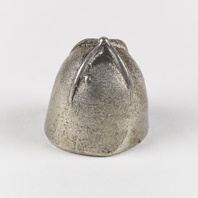
Viking Objects
Reproduction Lead Gaming Pieces
Reproduction lead gaming pieces of a type commonly found across the East Midlands, including at the Torksey Viking camp. The reproductions are tin alloy while the originals were made of lead. These gaming pieces would have been used to play hnefatafl or Nine Men’s Morris, both of which are games known to have been played by Scandinavians throughout the Viking diaspora. It has also been suggested that these might have been weights.
Read More
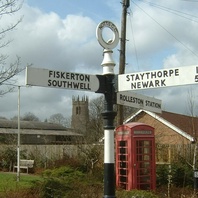
Viking Names
Fiskerton
Fiskerton, in the Thurgarton Wapentake of Nottinghamshire, is from the Old English elements fiscere ‘fisher’ and tun ‘farm, settlement’. The pronunciation has however been influenced by Scandinavian-speakers (compare Old Norse fiskari with the same meaning). There is also a Fiskerton in Lincolnshire, which has undergone the same process.
Read More
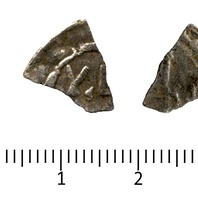
Viking Objects
Arabic Silver Dirham Fragment (SWYOR-1AE8AA)
This silver dirham fragment does not provide enough information to determine the ruler or moneyer but it seems to be from the seventh to ninth century. The dirham was a unit of weight used across North Africa, the Middle East, and Persia, with varying values which also referred to the type of coins used in the Middle East during the Viking Age. These coins were extremely prized possessions not only for their silver value but as a way of displaying one’s wealth and vast trade connections. Millions of Arabic dirhams would have been imported throughout the Viking world and are mostly found in hoards.
Read More
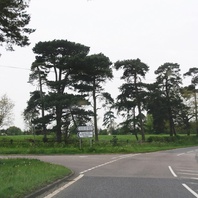
Viking Names
Toynton All Saints
Toynton All Saints, in the Bolingbroke Wapentake of Lincolnshire, is probably ‘the farmstead, village associated with or called after Tota’, from the Old English male personal name Tota with the Old English medial connective particle -ing and Old English element tun ‘farm, settlement’. Alternatively, the first element could be Old English tot ‘a look-out’. Thus, ‘farm/settlement at *Toting (= the look-out place)’. The affix is from the dedication of the church.
Read More

Viking Names
Riby
Riby, in the Yarborough Wapentake of Lincolnshire, was originally an Old English compound Rygetun ‘the farmstead or village where rye grows’. The Old English tun ‘farm, settlement’ was replaced by Old Norse by ‘farm, settlement’.
Read More
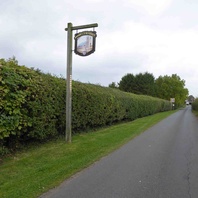
Viking Names
Fenby
Fenby, in the Haverstoe Wapentake of Lincolnshire, is an Anglo-Scandinavian hybrid from Old English fenn ‘a fen, a marsh, marshland’ and Old Norse by ‘a farmstead, a village’. It is most likely to be a partial Scandinavianization of an earlier Old English place-name, perhaps Fenton, with a similar meaning. Fenby is now a joint parish with Ashby, and the name survives in Fenby Farm, which lies in what must have been a fenny area on the lower slope of the Wolds.
